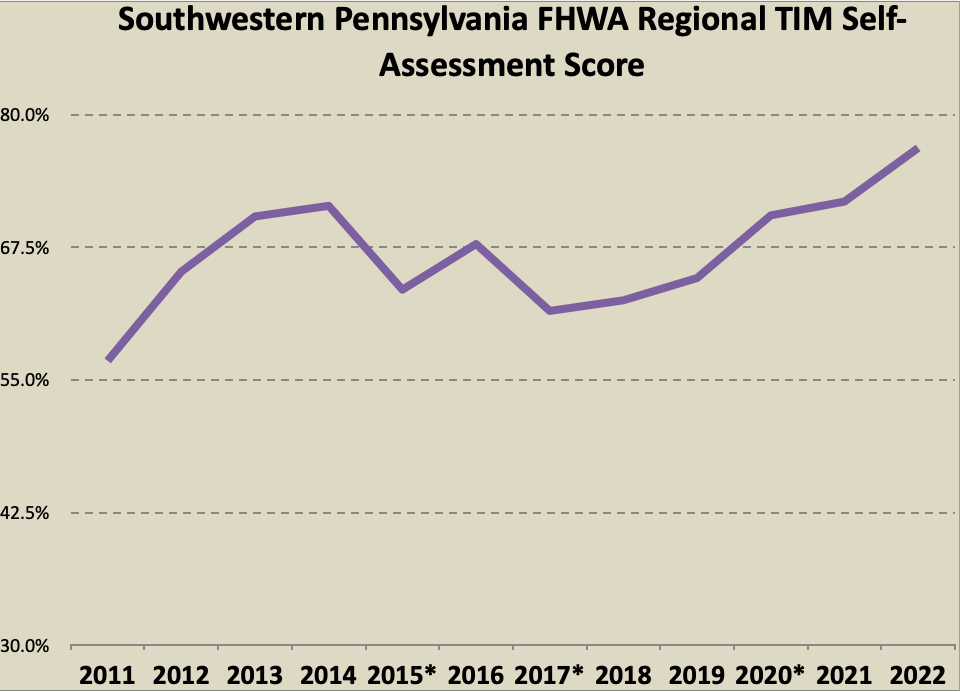Operations & Safety
Revitalization and redevelopment of existing communities is a priority. Our Ops/Safety programs actively help to manage and operate the region’s transportation system, allowing it to function at its full potential. Transportation and development choices prioritize safe and secure multimodal and intermodal networks for people and goods.
Safety Planning
2025 Regional Safety Action Plan
Click HERE to learn more about our Regional Safety Action Plan update, ‘Get Safe!’.
We have adopted the statewide performance target established by PennDOT of a 2% reduction per year across the following five measures:
- Number of fatalities (all public roads)
- Rate of fatalities (all public roads, per 100 million vehicle miles traveled)
- Number of serious injuries (all public roads)
- Rate of serious injuries (all public roads, per 100 million vehicle miles traveled)
- Number of non-motorized fatalities and serious injuries (all public roads)
For additional information visit PennDOT’s Safety Program
Resources
- 2020 Regional Transportation Safety Action Plan
Traffic Incident Management
To help regional organizations enhance the delivery of traffic incident management services and products, we facilitate a dialogue between practitioners across several disciplines.
Active TIM Teams
I-79/I-76 Local TIM
Started in 2013, this is our longest tenured local TIM Team. This team focuses on roadway incidents on I-79 and the Pennsylvania Turnpike in Northern Allegheny County and Southern Butler County
Pittsburgh Tunnels Local TIM Team
The Tunnels are some of the most important transportation infrastructure in our region, therefore the Pittsburgh Tunnels Local TIM Team was created to improve responder safety and promote safe, quick clearance of roadway incidents in or near the PennDOT owned tunnels.
SR 30 Local TIM Team
This TIM team focuses on improving responder safety and promoting safe, quick clearance of roadway incidents during the set of Route 30 projects located in North Versailles, North Huntingdon Township, and Irwin Borough.
FHWA TIM Capability Maturity Self-Assessment
This TIM Self-Assessment provides a formal process for state and local transportation, public safety, and private sector partners to collaboratively assess their TIM programs and identify opportunities for improvement. The assessment is conducted annually in each of the largest 75 urban areas. Each year the new assessment is compared against previous years to evaluate *progress in our TIM program. (See below for our progress since 2011)
FHWA TIM Capability Maturity Self-Assessment (PDF)

* In 2015 and 2017, more specific scoring for each question was added and therefore may see a score decrease.
Resources
- TIM Resources
Regional Traffic Signal Program
Our Regional Traffic Signal Program provides technical assistance, and potential funding to municipalities throughout our region.
Since 2008, SPC and our planning partners have been assisting local governments with improving traffic signal operations by optimizing traffic signal timings and upgrading existing traffic signal equipment. We have now completed the third cycle of this important regional program. Together the three cycles have invested nearly $11 Million to improve traffic signals in the region and results have yielded $51 of public benefit for every $1 spent in terms of reduced delay, reduced vehicular stops, reduced fuel consumption, and reduced emissions.
A summary of the benefits and costs of this program can be found here.
Visit our YouTube Channel to view Before/After Retiming Videos & Project Summaries
Resources
- Traffic Signal Retiming Videos
- Traffic Signal Project Summaries
- 4th Cycle of the Regional Traffic Signal Program
- 3rd Cycle of the Regional Traffic Signal Program
- City of Washington Main Street
- North Huntingdon Twp & Irwin Borough
- Butler County
- Slippery Rock Borough
- Cranberry Twp Rochester Road
- Cranberry Twp, Seven Fields Borough
- Cranberry Twp & Marshall Twp
- Midland Borough
- Ellwood City Borough
- Ambridge Borough
- Brentwood
- Green Tree Borough
- Municipalities of Bethel Park/Upper St. Clair
- City of McKeesport
- Regional Traffic Database
Transportation Operations & Safety Forum
Our Transportation and Operations and Safety Forum meets 3 to 4 times per year and brings together traffic engineers, safety professionals, and transportation planners from around the region to collaborate and share information on projects that work toward improved efficiency and safe operation of the transportation system. We continue to lead planning for safe and effective transportation operations in Pennsylvania
Resources
- Meeting Agendas & Minutes
- 2023
- 2022
- June 23, 2022
- October 20,2022
- 2021
- Archived Meeting Minutes and Agendas
Congestion Management Process
Federal transportation legislation requires that each metropolitan planning area in the United States have a Congestion Management Process, or CMP. The CMP is a regional program to address and manage congestion within the 10-county Southwestern Pennsylvania region in order to facilitate the movement of people and goods.
The goal of the CMP is to provide information that helps transportation planners, professionals and others to understand the overall congestion climate in individual corridors and the region. Data on the congestion climate helps us, in partnership with other agencies, to formulate congestion management strategies. Data and information from the CMP benefits the transportation planning process by helping the region focus limited federal transportation dollars where they can have the greatest impact.
Special Studies
- Diverging Diamond Interchange/Intersection – Washington Road (SR19) and I-70/79 Study
- Brodhead Road Corridor Planning Study
- Final Report
- Appendices
- Appendix A
- Appendix B
- Appendix D
- D0 – Cover Index
- D1 – Outreach Summary
- D2 – Interview Contact List
- D3 – Location Specific Survey and Interview Comments
- D4 – Wikimap Comment Matrix
- D5 – Public Meeting 1 Registration
- D6 – Initial Survey Results
- D7 – Public Meeting 2 Registration
- D8 – Public Meeting 2 Breakout Notes
- D9 – Alternative Survey Results
- D10 – Steering Committee Notes and Slides
- Final Video
- Webinar Playlist
- State Route 8 Corridor Operations Planning Study
- State Route 18 Corridor Operations Planning Study
- State Route 30 Corridor Operations Planning Study
- State Route 885/Second Avenue Multimodal Corridor Planning Study
- Regional Cashless Tolling Study
- Regional Roundabout Screening Study
Intelligent Transportation Systems
We participate in statewide and national discussions concerning advancements in Intelligent Transportation Systems (ITS), including a statewide connected and autonomous vehicle work group on emerging technologies.
Resources
Regional Operations Plan
We continue to work with our partners to implement initiatives from the seven priority areas contained in the 2019 Regional Operations Plan.
Resources
- Regional Operations
Highway Safety Improvement Program (HSIP)
The Highway Safety Improvement Program (HSIP) is a core Federal-aid program with the purpose to achieve a significant reduction in traffic fatalities and serious injuries on all public roads, including non-State-owned roads and roads on tribal land. The HSIP requires a data-driven, strategic approach to improving highway safety on all public roads with a focus on performance. The goals of the program is to address PA Strategic Highway Safety Plan (SHSP), project selection by Data Driven Safety Analysis (DDSA), and HSIP Set-Aside project solicitation.
2025-2026 HSIP Set Aside Projects.
Resources
- PennDOT Pub 638 (Highway Safety Program Guide)
- Pennsylvania Strategic Highway Safety Plan (2022)
- PennDOT Safety Infrastructure Improvement Programs & Tools
- FHWA Highway Safety Programs
Road Safety Audits
We have developed a RSA program for Southwestern Pennsylvania as part of our Transportation Operations and Safety planning efforts. Road Safety Audits examine of existing or future roads using an independent, multidisciplinary team to identify potential road safety issues and opportunities for proactive safety improvements. SPC integrates safety evaluations into managed funding programs.
Resources
Operations & Safety Contacts
Manager, Transportation Operations and Safety
(412) 391-5590 x0338
eschoss@spcregion.org
Transportation Planner III - Operations and Safety
(412) 391-5590 x0362
NHirsch@spcregion.org


